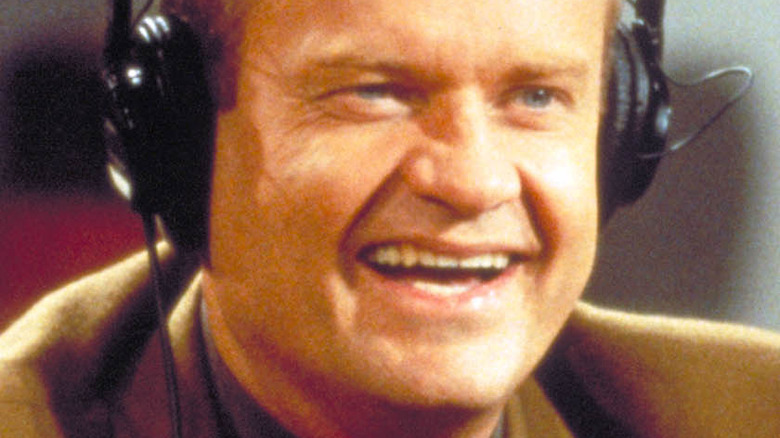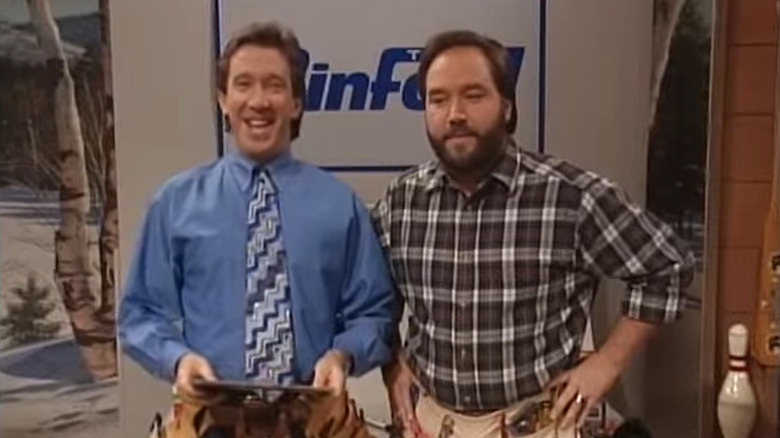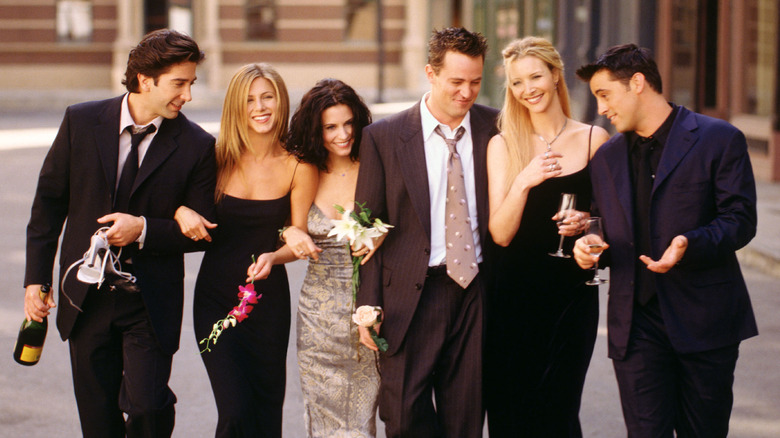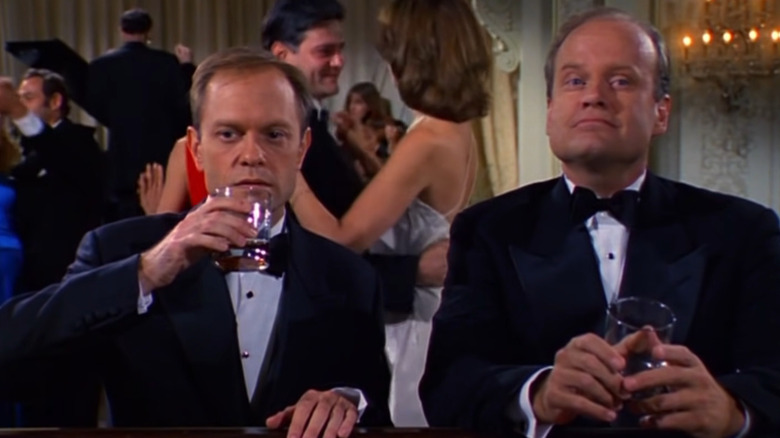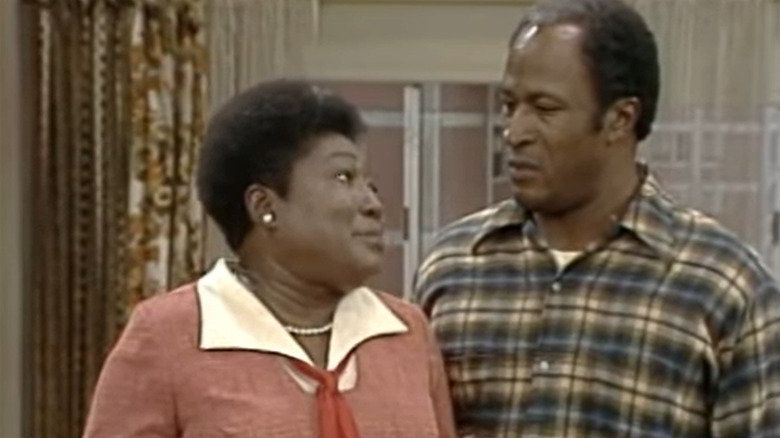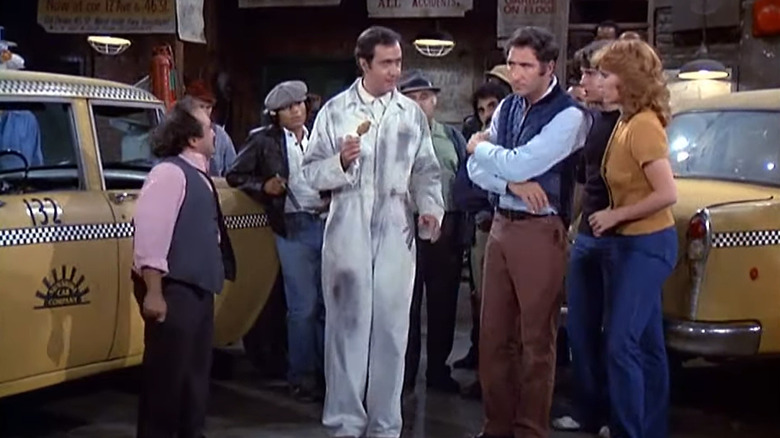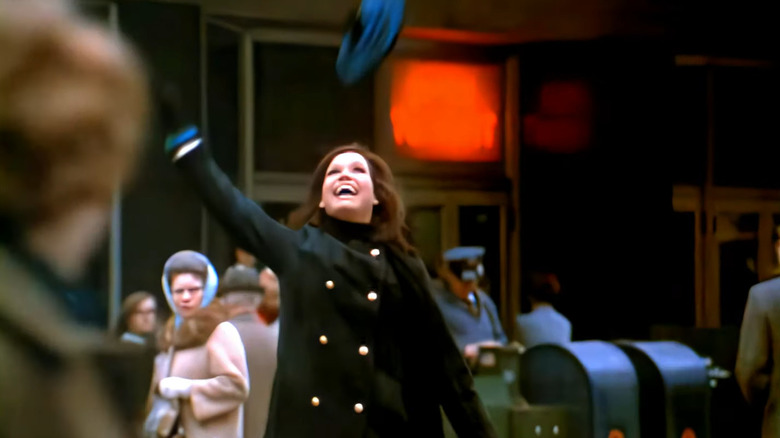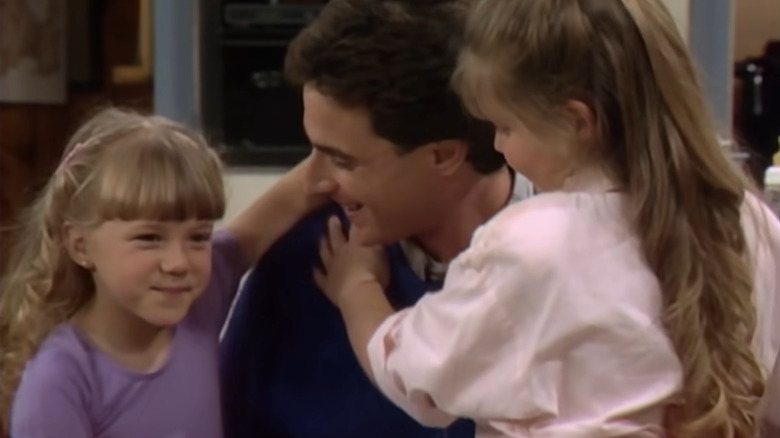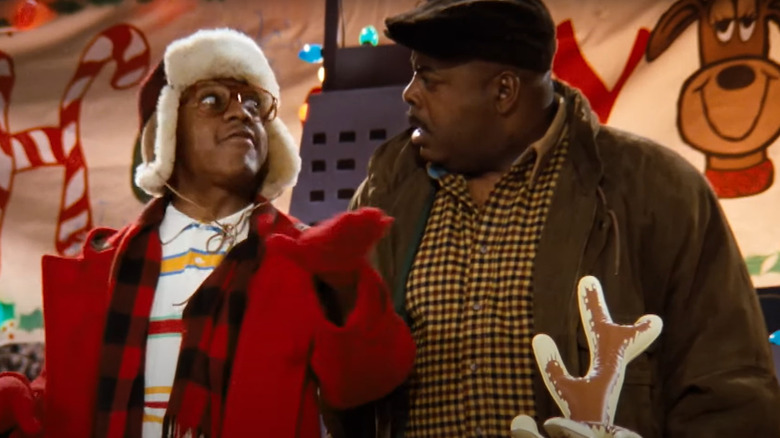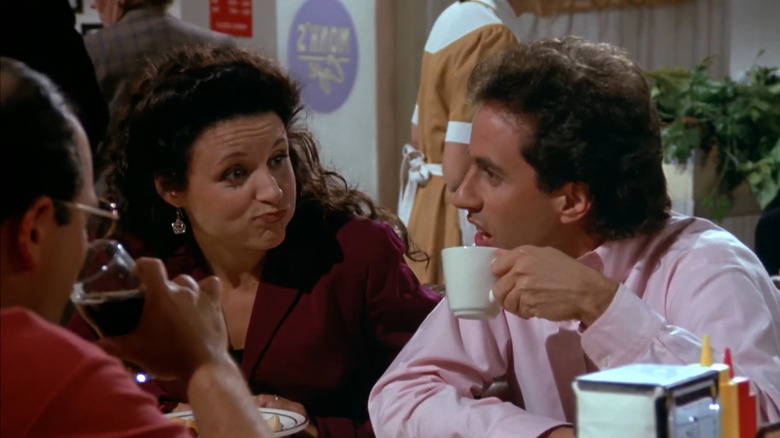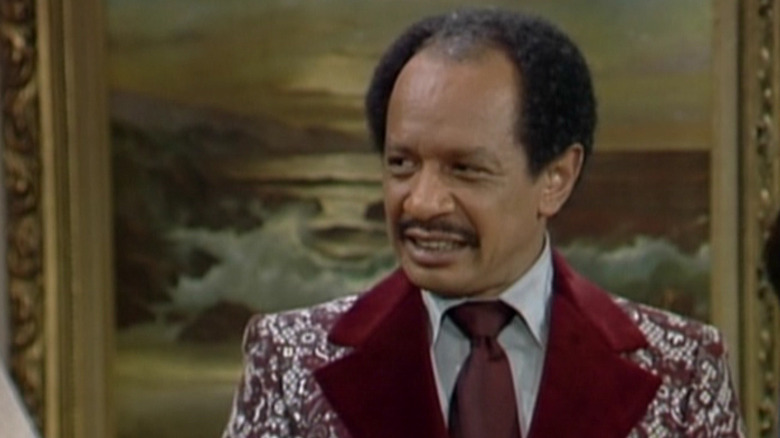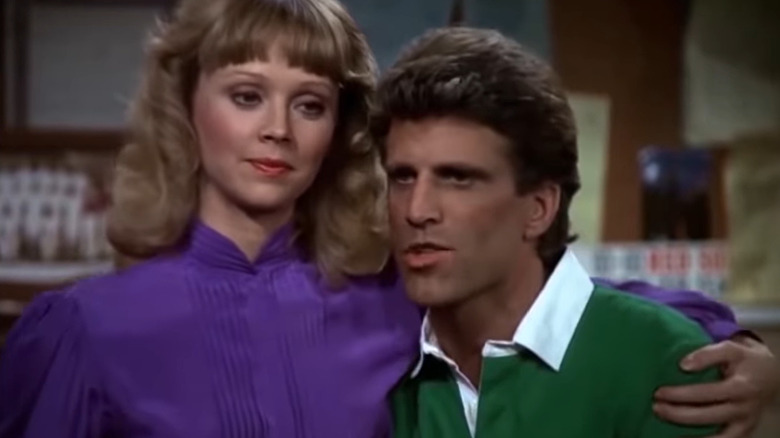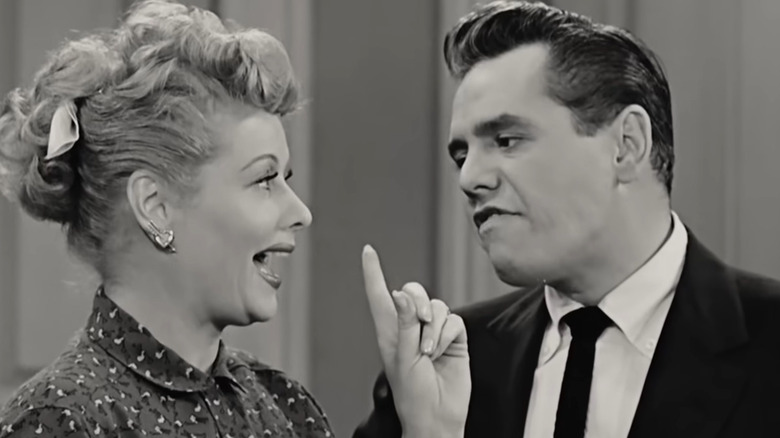Classic Sitcoms We Want To Get The Dramatic Treatment
Let's face it, we live in the intellectual property era, a business school way of saying "every movie, TV show, or book is ripe for reboots, remakes, or sequels." However, now we're seeing something else — a reimagining. Take a story people know and love but tell it in a different way. Enter "Bel-Air." It's based on the popular syndicated sitcom "The Fresh Prince of Bel-Air," which ran for six seasons on NBC from 1990 to 1996. (You're humming the theme in your head right now, right?) Only instead of a sitcom with a studio audience, the story is being told as a single-camera drama.
"Bel-Air" began with a proof-of-concept trailer and short film in 2019 from creator Morgan Cooper, which caught the attention of Will Smith himself and became a Peacock series in 2022. So the moral of the story is if you're dreaming of making an "ALF" drama series, go for it. Of course, "Fresh Prince" and its semi-autobiographical, rags-to-riches story of Will Smith going from the mean streets of Philly to the posh neighborhoods of Bel-Air lends itself well to drama, which got us thinking: What other shows work with this reimagining? We admit some of these would be stretches, but they'd all definitely be interesting. See if you agree with our picks. Here are classic sitcoms we want to get the dramatic treatment!
Home Improvement
"Home Improvement" as a drama? "Euughh!?" (That's our attempt at spelling Tim Allen's grunt.) While it seems like a stretch to turn the tale of Tim "The Toolman" Taylor into a drama, "The Man's Kitchen" and "The Man's Bathroom" episodes were very compelling. "Home Improvement" ran for eight seasons from 1991 to 1999 on ABC, making it one of the most successful sitcoms of the 1990s. The show followed Tim Taylor (Allen), the Bob Villa-like host of TV's "Tool Time," and his family in suburban Detroit. Taylor's misadventures included competing with his more credible co-host, Al Borland, gaining wisdom from Wilson — his neighbor whose face was always absurdly obscured — and trying (and failing) to stay out of the E.R. after some home improvement project went comically awry.
Basically, it's the standard nuclear family sitcom (dumb dad, smart mom, kids with wildly different personalities) but updated for the 1990s. However, the family from "Home Improvement" would be in a very different place today, which could make for an interesting drama. How would Allen/Taylor, whose persona was comically macho, confront our culture's changing perceptions of masculinity? Would a man who worked with his hands struggle to support a family in an economy where blue collar work is on the decline? We imagine a dramatic "Home Improvement" being similar to "Friday Night Lights," only swapping eastern Michigan in for West Texas.
Friends
"Friends" ran for 10 seasons on NBC and certainly left its mark. According to Time, over 65 million viewers watched the finale, "The Last One," making it the fourth most-watched sitcom finale in history. Its popularity hasn't waned. HBO Max paid $500 million for streaming rights, while 29% of U.S. streaming households watched the reunion special on May 27, 2021. What made this tale of six friends who lived in impossibly spacious apartments in New York City so compelling to so many people?
It was the perfect distillation of Gen-Xer angst about, well, everything: relationships, friendships, career, family, and the ever-present struggle to "have it all" within a socially acceptable time frame. Basically "Reality Bites," only, y'know, really, really popular. "Friends" would lend itself very well to drama. However, instead of recreating "Friends" with a Millennial/Gen Z cast, we think there's something inherently Gen X about this story. Maybe because Gen Xer's simultaneously sought and resisted the American Dream, while following generations seem to have abandoned it entirely. The series debut could be called "The One without the Laugh Track."
Frasier
"Frasier" is arguably the most successful sitcom spinoff in history, depending on if you consider "The Simpsons" (which began as a skit on "The Tracey Ullman Show") a spinoff. Transplanting Dr. Frasier Crane, M.D., the smooth-talking psychiatrist from "Cheers," from Boston to Seattle, "Frasier" ran for 11 successful seasons from 1993 to 2004 on NBC. The finale, "Goodnight, Seattle," was watched by an estimated 33 million viewers, though earlier reports had it at 25 million. Either way, a lot of people watched the decadent, decorous, and dandy doctor's denouement on May 13, 2004.
Surprising nobody, "Frasier" will be getting the reboot treatment on Paramount+ since, despite being on NBC (which owns Peacock), it was produced by Paramount. It's complicated. The show will be a return to the studio audience sitcom format ... but what if it were a dramatic series? Much of the comedy came from the urbane Dr. Crane's relationship with his live-in father, the former police officer Martin Crane. That dynamic also lends itself to drama. Frasier was also a single father separated from his son by thousands of miles. What was that like? And as a radio psychiatrist, how would Dr. Crane react to our culture's more open attitude about mental health? We're stoked for the comedic reboot but would love to see a dramatic reimagining too.
Good Times
While "Sanford & Son" was the first primetime sitcom starring predominantly Black performers, "Good Times" was the first to feature a Black nuclear family. While "The Cosby Show" 10 years later was about an upper middle-class Black family, the Evans family were very much the working poor, residing in an impoverished housing project in inner-city Chicago. "Good Times" was a spinoff of a spinoff, featuring characters who started in "Maude," which itself was a spinoff of "All in the Family." Between those shows, "The Jeffersons," and a few others, clearly there was an "All in the Family" universe before anybody ever heard of the MCU.
Anyway, "Good Times" ran for six seasons from 1974 to 1979 on CBS. Despite being a successful comedy, "Good Times" dealt with serious subject matter, with lead character Florida Evans working as a maid as her husband, James, bounced from job to job, scraping by doing manual labor while refusing to accept charity, despite frequent bouts of unemployment. All the while, Florida and James dealt with the trials of raising three sons in a poor neighborhood. The synopsis sounds like a drama, but "Good Times" was very much a comedy, though we could see it playing serious if it was rebooted today.
Taxi
What do "Taxi Driver," one of the most popular movies of the 1970s, and "Taxi," one of the most popular TV shows of the 1970s, have in common (besides being about taxi drivers in New York)? Quite a lot, actually. Urban isolation. Loneliness. The crushing ennui of life in '70s America. It's just one played this for gasps, while the other played it for laughs. But what if "Taxi" went the dramatic route like "Taxi Driver?" No, we're not suggesting that Danny DeVito's Louie DePalma become a psychopathic vigilante who goes on a crusading killing spree (though we would definitely watch that show). Rather, "Taxi" could have easily told the same story with the same characters but been a drama instead.
At its core, "Taxi" is about working-class people struggling to make ends meet, find meaning in their lives, and escape the confines of the cab, all with an overbearing, cruel manager who always tries to stiff them while living in a city that chews people up and spits them out. Man, when we put it like that, calling "Taxi" a comedy seems kinda dark. "Taxi" ran for five seasons on ABC (1978-1982) and NBC (1982-1983) and was a critical and commercial success. We doubt a full-on drama would be as iconic, but if nothing else, we'd love to see a serious reimagining of Andy Kaufman's Latka Gravas and Christopher Lloyd's Reverend Iggy.
The Mary Tyler Moore Show
With a theme song called "Love Is All Around You," featuring lyrics like "who can turn a world on with her smile?" and "you're going to make it after all," you might forget that "The Mary Tyler Moore Show" was pretty revolutionary. As Elena Nicolaou writing in Refinery29 put it, "'The Mary Tyler Moore Show' was the sitcom the women's movement needed. It might sound absurd now, but Mary Richards was a radical character because Mary was unabashedly single and more interested in pursuing her career at a TV station than nailing down another fiancé." Before "Murphy Browne," "Roseanne," "Grace Under Fire," "Sex and the City," and so many more, there was Mary Tyler Moore, whose namesake sitcom ran for seven seasons on CBS from 1970 to 1977.
The setup seems standard today: A single woman in the big city pursues the brass ring, not a wedding ring. The same show set in the present day wouldn't be that unique, but set it as a drama in the 1970s and you've got a show reminiscent of "Mad Men" — part character study, part historical critique of a bygone era. The show practically writes itself. The only problem with a dramatic reimagining of "The Mary Tyler Moore Show" is you cannot possibly recast TV icons Mary Tyler Moore, Betty White, and Ed Asner.
Full House
"Full House" had a pretty simple premise: What if you do the traditional nuclear family sitcom but without a mom in sight? Instead, the Tanner household is a widower dad, his three daughters, and their two uncles, one of whom is an irresponsible ladies man and the other a goofy DJ. Hey, what's better than one dumb sitcom dad? Three!
"Full House" premiered on September 22, 1987, two months before the year's highest-grossing movie, "Three Men and A Baby," so clearly something was in the air. While "Three Men and A Baby" came and went (and isn't really talked about today), the legacy of "Full House" lasted much longer than its eight seasons on ABC, from 1987 to 1995. In fact, "Full House" remains so popular with fans that its sequel, "Fuller House," ran for five seasons from 2016 to 2020 on Netflix. Nostalgia is potentially the most powerful force in the universe (just watch the Super Bowl LVI half-time show).
Despite being popular with fans, "Full House" was never a big hit with critics. Taking our nostalgia glasses off, "Full House" really was a convoluted cheese-fest kept afloat by its charismatic cast. However, if looked at from a dramatic bent, you have a story about three men in various stages of adulthood trying to father three daughters and struggling mightily in the process. Okay, so it ain't "The Sopranos," but maybe something on The CW?
Family Matters
"The Cosby Show" proved there was a massive audience for sitcoms centered around middle-class Black families. In its wake came another sitcom about a Black family that wasn't as popular as "The Cosby Show" at the time but is arguably more iconic today: "Family Matters." The series started as a spinoff of "Perfect Strangers," making it one of the few examples of spinoff that was more successful than the original. "Family Matters" was a mainstay on ABC's TGIF lineup before switching networks to CBS in 1997. In total, "Family Matters" ran for nine seasons, bidding adieu on July 17, 1998.
"Family Matters" centered around a middle-class Chicago family, with Reginald VelJohnson starring as Officer Carl Winslow. A Black police officer who contends with racial tensions between minority communities and the police force in one of America's most crime-ridden cities seems ready-made for the dramatic treatment. That's especially true considering Officer Winslow was such a mild-mannered man who only ever wanted to do right by his community, do his duty, and be a good husband and father. The one challenge with making "Family Matters" a drama? How do you handle the most famous character from the show — Steve Urkel? Urkel was an inherently over-the-top, comic character, but TV's uber-geek could be toned down to be more realistic, serving as the springboard for an anti-bullying storyline. But is a toned-down, realistic Urkel really Urkel?
Seinfeld
"The comedy show about nothing" should have been a critical darling that lasted two seasons, only to be canceled and live on as a cult classic, a la "The Dana Carvey Show" or "Arrested Development." Yeah, about that ... turns out Larry David's brand of observational humor (oh yeah, and Jerry Seinfeld's too) really struck a chord with a lot of people. How many, exactly? Well, an estimated 76 million viewers tuned into "The Finale," making it one of the most watched TV programs ever. Not bad for a show that prided itself on not having lovable — or even likable — characters.
"Seinfeld" ran on NBC for nine seasons from 1989 to 1998, while its spiritual successor, "Curb Your Enthusiasm," continues its 11-season run to this day. How did this happen? Well, much like "Married... with Children" and "The Simpsons," "Seinfeld" helped change the face of American sitcoms from the warmth and comfort of "The Cosby Show" to unabashed cynicism — a cultural shift that continues to this day. What made "Seinfeld" funny was you weren't supposed to laugh at this stuff ... but you just couldn't help yourself. We were used to dramas about bad people doing bad things; "Seinfeld" was about how casually horrible, selfish, and neurotic regular people could be. A dramatic reimagining could work, but we concede it probably would be canceled after only a few seasons.
The Jeffersons
"All in the Family" was groundbreaking for bringing serious situations and storylines ripped from the headlines to the sitcom format. However, a dramatic rendition wouldn't be much different from the original (just not as funny and without the live audience). So instead, we're going to talk about its spinoff series, "The Jeffersons." Also a groundbreaking show, "The Jeffersons" told the story of Archie and Edith Bunker's neighbors, George and Louise Jefferson, who ditched Queens to move on up to Manhattan to a deluxe apartment in the sky.
One of the longest-running sitcoms ever, "The Jeffersons" lasted for 11 seasons from 1975 to 1985, longer even than the nine seasons of "All in the Family." While "The Jeffersons" already tackled some serious subject matter (racism, suicide, the KKK) and even prominently featured racial epithets on prime time TV, the show itself was very much a comedy. But what if it wasn't? You wouldn't have to change much. A successful Black couple from working-class Queens encountering prejudice in their Manhattan penthouse in the 1970s is ripe for dramatic dissections on race and class, especially with George Jefferson's penchant for bigotry and sexism of his own. But like most shows on this list, "The Jeffersons" proved that oftentimes the best way to tackle tough issues is with laughter.
Cheers
"Cheers" was one of the most successful sitcoms of the 1980s ... or ever. "Cheers" ran for 11 seasons on NBC and continues today on syndication and streaming because in addition to being really funny, watching it is as comforting as sipping a cold brew with your buddies at your favorite bar. An estimated 80.4 million viewers tuned into the final episode, "One for the Road," on May 20, 1993, making it the second most-watched finale ever, comedy or otherwise — behind only "M.A.S.H." — and pulling in numbers typically reserved for the Super Bowl.
"Cheers" wasn't revolutionary by any means, like "All in the Family" or "Seinfeld." Instead of breaking new ground, it rested on a familiar territory, and it was simply the perfect embodiment of the sitcom form. It's why "Cheers" was (and is) so popular across the board. So messing with its sitcom formula would be like trying to make a live-action remake of a Studio Ghibli movie. However, you can't deny that the "Cheers" ensemble would lend itself well to drama. The show was about a bunch of working-class stiffs, plus Dr. Frasier Crane, sipping away their stresses, struggles, and sorrows in the company of friends at a place where nobody would judge them (well, except for Carla Tortelli) and where everybody knew their name. So yeah, a "Cheers" drama would be great but probably really depressing.
I Love Lucy
Calling "I Love Lucy" a sitcom is like calling Elvis Presley a singer. "I Love Lucy" isn't a classic sitcom; it is the classic sitcom — a totem of Americana that transcended the TV screen to become an iconic piece of global culture.
While "I Love Lucy" wasn't the first sitcom, its stars and executive producers, Lucille Ball and Desi Arnaz, effectively established the format that continues to this day. That's both in terms of production — with its three-camera, pre-recorded, studio audience setup — and creative content, with its storyline centered around a charismatic lead within a self-contained universe. This was all in contrast to other 1950s sitcoms, which were part of a variety show ("The Honeymooners") or had leads breaking the fourth wall ("The George Burns & Gracie Allen Show").
All of which is to say that turning the ultimate sitcom into a drama borders on sacrilege. We humbly ask the reader to hear us out and not burn us at the stake. Beneath the comedy, "I Love Lucy" has all the ingredients for a drama — an uber-talented song-and-dance man facing prejudice for being Cuban in 1950s America, with a beautiful housewife who adores her family life while also dreaming of establishing an identity for herself. With the Oscar-nominated "Being the Ricardos" and Amy Poehler's documentary "Lucy and Desi" bringing the First Couple of American comedy back in the public eye (really, they never left), maybe now is the time for a dramatic retelling of their most famous characters?
